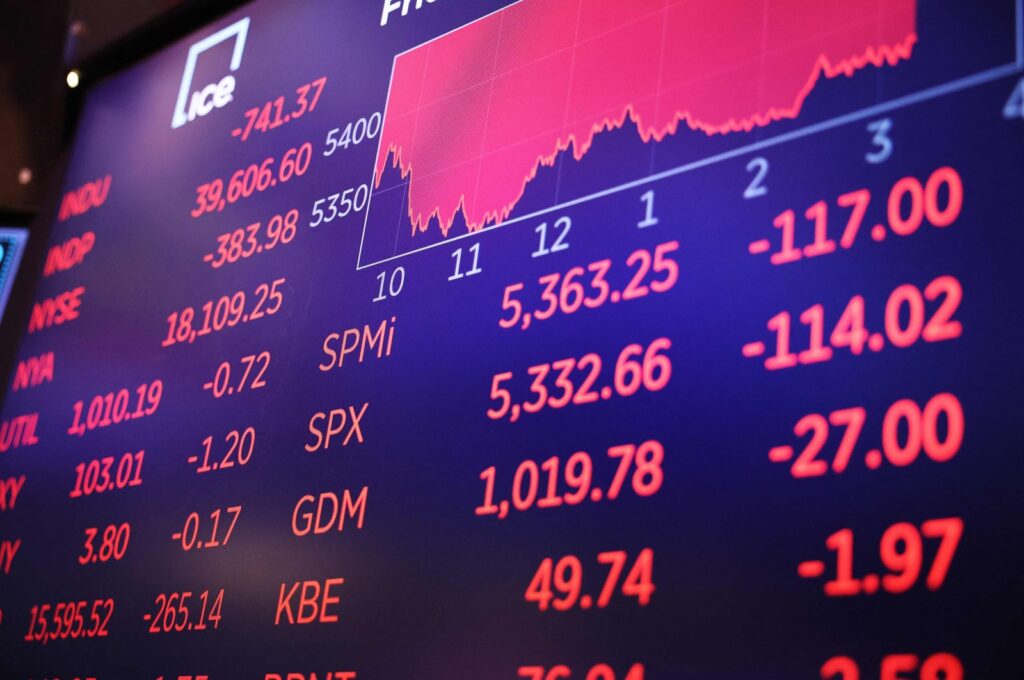
Asian Markets Dive on U.S. Economic Worries

Asian stocks experienced significant declines on Monday, extending last week’s losses due to mounting concerns over a potential U.S. economic slowdown. Japanese markets are on the brink of entering a bear market, retreating from their July record highs.
Wall Street’s Influence on Asian Markets
The downturn in Asian stocks followed a steep decline on Wall Street last Friday. Substantially weaker-than-expected nonfarm payrolls data heightened fears that the Federal Reserve might maintain high interest rates longer than necessary, potentially hindering a soft landing for the U.S. economy. Additional middling economic reports and mixed earnings from major technology companies further pressured U.S. markets, setting a negative tone for Asian stocks.
U.S. Stock Index Futures Continue to Decline
U.S. stock index futures extended their losses in Asian trading on Monday, contributing to the region’s market pessimism.
Japan’s Nikkei and TOPIX Head Toward Bear Market
Japan’s Nikkei 225 fell by 5.5%, while the broader TOPIX dropped nearly 7% on Monday. Both indices are now more than 20% below their July record highs, indicating a potential entry into bear market territory if they close at current levels. Japanese stocks were heavily affected by profit-taking, with foreign investors withdrawing as the Japanese yen appreciated sharply. This trend was driven by hawkish signals from the Bank of Japan, which recently raised interest rates and hinted at more hikes in 2024. Weak earnings from major automaker Toyota Motor Corp (NYSE
) (TYO:7203) also dampened market sentiment. Key earnings reports from Sony Corp (TYO:6758) and SoftBank Group Corp. (TYO:9984) are expected in the coming days.
China’s Losses Mitigated by Positive PMI Data
China’s Shanghai Shenzhen CSI 300 and Shanghai Composite indexes saw relatively smaller declines, falling 0.3% and 0.4%, respectively. These indices remained at more than five-month lows, having already experienced significant losses over the past two months. Hong Kong’s Hang Seng index fell 1%. Private purchasing managers index (PMI) data revealed that China’s services sector grew slightly more than expected in July, providing a modest boost to market sentiment following poor manufacturing sector readings last week. Upcoming key Chinese economic reports, including trade and inflation data, will be closely watched.
Broader Asian Markets Hit by Growth Concerns
The broader Asian markets suffered as fears of worsening economic conditions dampened risk appetite. Safe havens like the Japanese yen and gold saw increased inflows. Australia’s ASX 200 fell by 2.5%, with attention now on the Reserve Bank of Australia’s meeting on Tuesday, where rates are expected to remain steady. South Korea’s KOSPI dropped 5.5%, driven by profit-taking and weak earnings from major U.S. tech firms. Futures for India’s Nifty 50 index indicated a negative open, with profit-taking expected after the Nifty reached record highs above 25,000 points last week.
For more insights and updates on global market trends, stay tuned to our website.
Never miss any important news. Subscribe to our newsletter.
Related News


USD/INR Slows Down Amid Mixed Indian PMI Data.


USD/INR Rises as Markets Anticipate Fed Rate Decision.


Gold Price Nears Record High Amid Strong Safe-Haven Demand.



USD/INR Gains Momentum Amid Trade Tariff Uncertainty.



Never miss any important news. Subscribe to our newsletter.
Editor's Pick


USD/INR Slows Down Amid Mixed Indian PMI Data.


USD/INR Rises as Markets Anticipate Fed Rate Decision.



